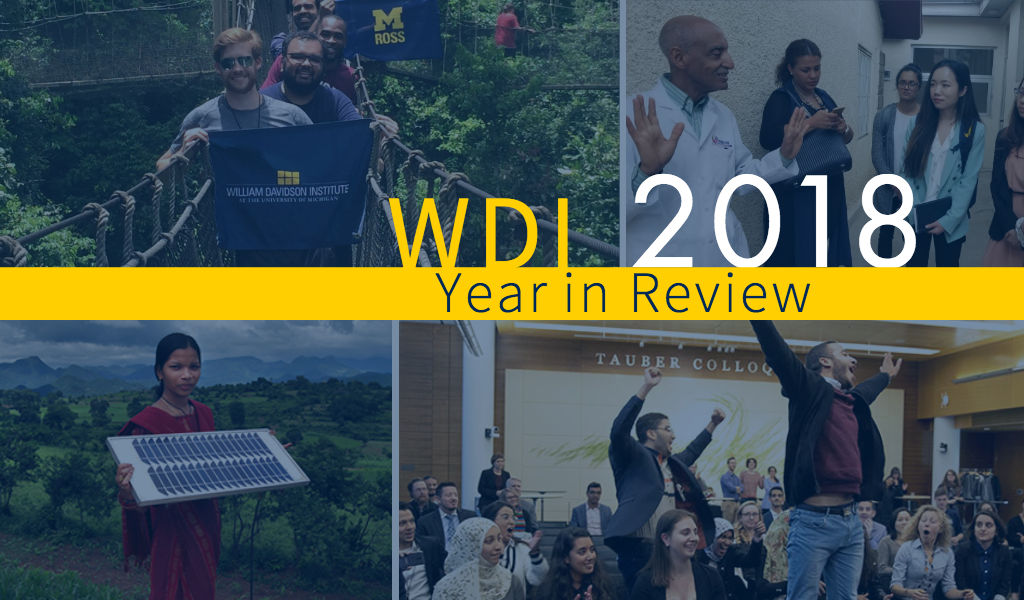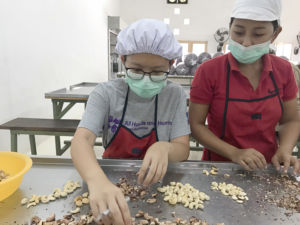A Look Back: WDI Impact in 2018
Tuesday, December 18, 2018

Improving reproductive health supply chains to boost access to family planning products in Mozambique. Educating senior managers from around the Baltics. Helping both investors and enterprises they support better measure impact in Latin America. Creating new MBA-level curriculum for universities in Papua New Guinea.
These partner projects are just a few examples of the work WDI performed around the world in 2018. Working with a robust set of private sector and nonprofit partners on a diverse number of projects, WDI effectively applied business skills in low- and middle-income countries (LMICs) in impactful ways.
In all, WDI teams worked on more than 40 projects with more than 40 partners in more than 40 countries this past year that focused on our core consulting sectors—education, energy, finance and healthcare, as well as our management education programs, entrepreneurship development, measurement and evaluation services and the deployment of University of Michigan graduate students around the world.
“In 2018, I was impressed by the degree to which the Institute integrated the energy and talents of our staff, University of Michigan students and faculty leaders to address multiple challenges facing for-profit and non-profit organizations,” said WDI President Paul Clyde. “While most of these projects were in one of our key focus areas—Energy, Healthcare, Management education or Finance—many drew on expertise that cut across sectors or disciplines to deliver more complete solutions.”
WDI’s project work leveraged the knowledge and expertise of the Institute’s staff, its research fellows and faculty from the University of Michigan and other world-class higher education institutions to develop business solutions in LMICs. Additionally, WDI disseminated what it learned doing work in the field through published research reports, academic journal articles and notable blog posts. The Institute also contributed to U-M student and faculty enrichment by hosting several compelling speakers at the Ann Arbor campus.
PROJECTS

Members of the LIFE project consortium visit a produce stand in Turkey and interviews the owner on how a green grocer sources his produce and his perspective on how he could potentially benefit from the LIFE Food Enterprise Center.
Our work in 2018 spanned the globe and included projects on a wide variety of topics and issues. Among the work, WDI launched a new consulting focus area in the energy sector, connected hundreds of students using virtual technology, developed a model to train nurses for a planned hospital in Ethiopia and trained refugees in the food industry in Turkey. Here are a few highlights from our project work this past year.
- WDI connected more than 500 students from Michigan, Egypt, Libya, Morocco and Tunisia for the M²GATE project that challenged them to design entrepreneurial solutions to social issues in the Middle East and North Africa (MENA) region. The project culminated with a pitch competition involving the top three student teams held at Michigan’s Ross School of Business in November.
- More than 1 billion people lack access to energy, a key motivation for the Institute’s decision to launch an Energy focus area in 2018. For its first project, WDI partnered with the Miller Center for Social Entrepreneurship at Santa Clara University to study how successful some enterprises in India were in bringing energy to marginalized communities. The work resulted in an important paper on what has been learned by those enterprises striving to bring energy access to those communities.
- The Michigan Academy for the Development of Entrepreneurs (MADE) showed progress in developing an instrument for entrepreneurs to assess specific challenges and generate recommendations on actions they can take to improve their performance. WDI is a founding partner of MADE.
- WDI is part of a consortium of U.S. and Turkey-based partners in the Livelihoods Innovation through Food Entrepreneurship (LIFE) project that support refugees in Turkey, and those in the Turkish host communities, to build businesses in the food sector.
- As part of WDI’s ongoing work with the Ethiopian American Doctors Group (EADG), which is building a hospital in the capital of Addis Ababa, the Institute developed a model to train nurses that meets international standards. WDI also made financial analysis and partnership recommendations to the organization.
- WDI’s Performance Measurement group was commissioned by the global medical technology firm Becton, Dickinson and Company (BD). The WDI team conducted monitoring and evaluation of two programs related to BD’s partnership with the U.S. President’s Emergency Plan for AIDS Relief (PEPFAR).
PUBLICATIONS
Throughout the past year, WDI has widely shared its research and field work a to a broader audience through a number of publications and online journals.
“Participating in the project to test the framework provided us a holistic understanding of poverty. WDI gave us the tools to guide decision-making and track progress towards broader development goals through data collection and analysis.”
—Mónica Varela, director of impact for the Clinton Giustra Enterprise Partnership
- WDI’s Performance Measurement team published an impact report, “Positive Change Through Actionable Metrics,” that highlighted its work with three social enterprises in Brazil, Nicaragua and Peru, including the Clinton Giustra Enterprise Partnership (see quote at right). The report provided recommendations on how organizations can achieve measurement that is meaningful for capturing impacts and making operational decisions.
- Near the end of 2018, the PMI team, along with two partners, compiled a detailed guide for companies and other private sector partners working with the U.S. Agency for International Development (USAID) to help them meet project goals and generate value. The report, “Nine Questions Every Company Should Ask to Strengthen their Partnership with USAID,” focuses on how companies can ensure good program management that’s also responsive to data.
- WDI’s work with the Clean Cooking Alliance (until recently known as the Global Alliance for Clean Cookstoves”) examined the effectiveness the organization strategies and the potential lessons for building a new global market for clean cooking solutions. The work yielded several articles in 2018 for Colm Fay, who leads WDI’s Scaling Impact and Energy initiatives, and WDI Senior Research Fellow Ted London. The two wrote an article published on the Stanford Social Innovation Review website that showcased the framework developed by Fay and London for accelerating impact industries—those enterprises made up of profit-seeking, scalable businesses that also seek to create substantial social and/or environmental impacts. The pair also wrote a blog post that appeared on PYXERA Global on four different, but interconnected stages of impact industry acceleration—accelerating investment, collective action, profitability and impact Colm and London identified during their research for the Alliance.

WDI intern Nadia Putri (pictured left)
A number of WDI employees penned blogs on their work or trends impacting their research that appeared on the Institute’s website.
- Andrea Bare and Erika Beidelman of the Healthcare team chronicled the two weeks they spent in Malawi exploring the country’s private sector landscape for family planning and reproductive health commodities.
- Daniel DeValve of our Grants Management team blogged about what questions small- to medium-sized enterprises (SMEs) should ask themselves before exporting to international markets.
- Speaking of SMEs, Ekta Jhaveri of WDI’s Finance sector focus conducted a Q&A with an investment manager focused on funding these enterprises—known as the “missing middle”—that are too big for microfinance institutions and too small for commercial banks.
- Amy Gillett, WDI’s vice president of Education, looked at the explosion of entrepreneurship in developing countries. Gillett also wrote about a management education conference she presented at and the push to identify innovative models of management education and bring them to emerging markets.
- Gillett teamed up with Kristen Babbie Kelterborn of the Grants Management team to write about how food entrepreneurship can help build bridges around the world.
- The Performance Measurement team of Heather Esper, Rebecca Baylor and Yaquta Kanchwala Fatehi wrote a blog on how their work shows that it is possible to bridge the gap between people and metrics in a meaningful way.
- Finally, Nadia Putri, who spent the summer of 2018 as a WDI intern in Bali, Indonesia explored on how the cashew company that she worked at is empowering women
SPEAKERS
In 2018, WDI hosted speakers as part of the the Institute’s Global Impact Speaker Series. While on campus, many of the speakers sat down for one-on-one interviews.
- In November, Tom Light, managing director of WaterEquity, the first-ever impact investment management firm with an exclusive focus on ending the global water crisis. During his interview with WDI’s Pascale Leroueil, Light talked about the structure of the organization and how it works with the private sector to accomplish its goals.
- During her visit to WDI in May, Johanna Mendelson Forman, a leading expert in the social gastronomy movement, talked with Babbie Kelterborn about how food can promote social good.
- And in February, author and professor Elmira Bayrasli spoke to students about entrepreneurship in emerging economies. She also was interviewed by WDI’s Gillett about global entrepreneurship and why it is growing in developing countries.
